Report on Capital Market Allocation in UK and International Markets
VerifiedAdded on 2023/01/04
|12
|3796
|109
Report
AI Summary
This report, prepared for Imagine Invest Holding, analyzes capital market allocation within the UK and internationally, focusing on the financial markets, capital allocation within the domestic economy, and international markets. It evaluates the UK's economy, considering factors like industrialization and trade policies. The report discusses financial instruments, the UK's significant role in global finance, and its domestic economy, including key industries and GDP. It explores capital allocation strategies within the UK, including investment in organic growth, mergers and acquisitions, and debt management. The report also evaluates the Australian economy, comparing its GDP, wealth, and key industries to that of the UK, and discusses the challenges related to industrialization and trade policies. The report highlights the importance of capital allocation for economic growth and provides a detailed overview of these concepts.
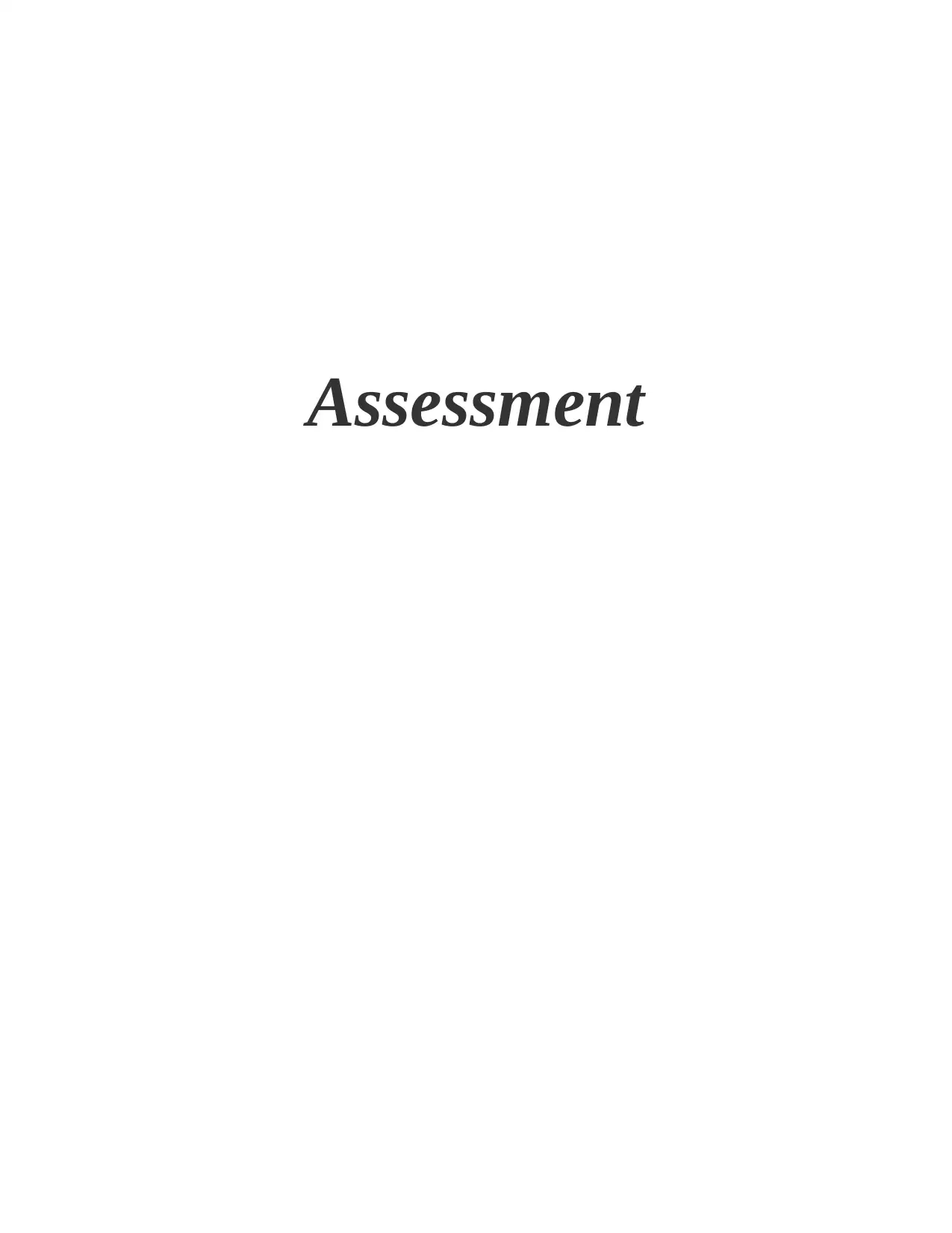
Assessment
Paraphrase This Document
Need a fresh take? Get an instant paraphrase of this document with our AI Paraphraser
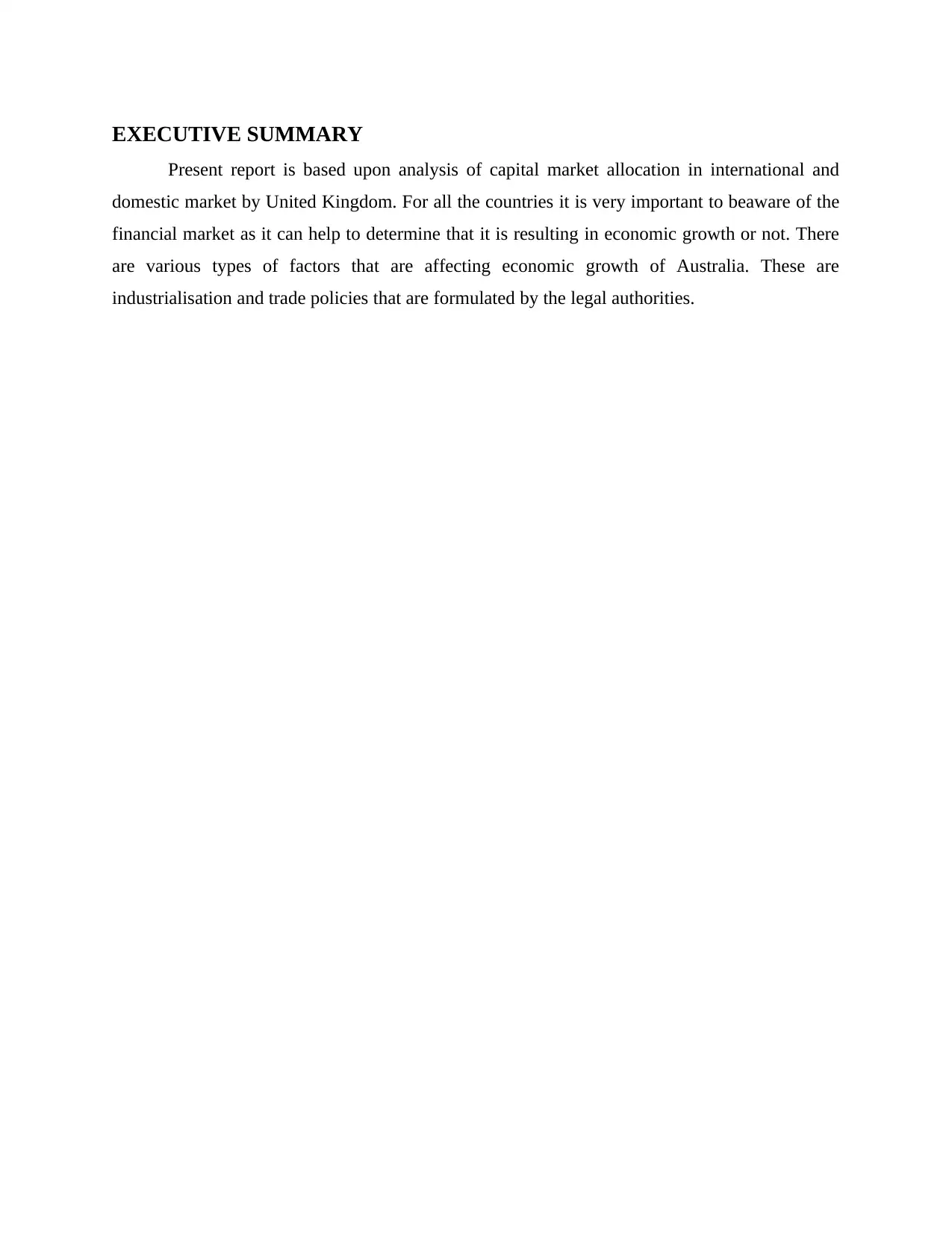
EXECUTIVE SUMMARY
Present report is based upon analysis of capital market allocation in international and
domestic market by United Kingdom. For all the countries it is very important to beaware of the
financial market as it can help to determine that it is resulting in economic growth or not. There
are various types of factors that are affecting economic growth of Australia. These are
industrialisation and trade policies that are formulated by the legal authorities.
Present report is based upon analysis of capital market allocation in international and
domestic market by United Kingdom. For all the countries it is very important to beaware of the
financial market as it can help to determine that it is resulting in economic growth or not. There
are various types of factors that are affecting economic growth of Australia. These are
industrialisation and trade policies that are formulated by the legal authorities.
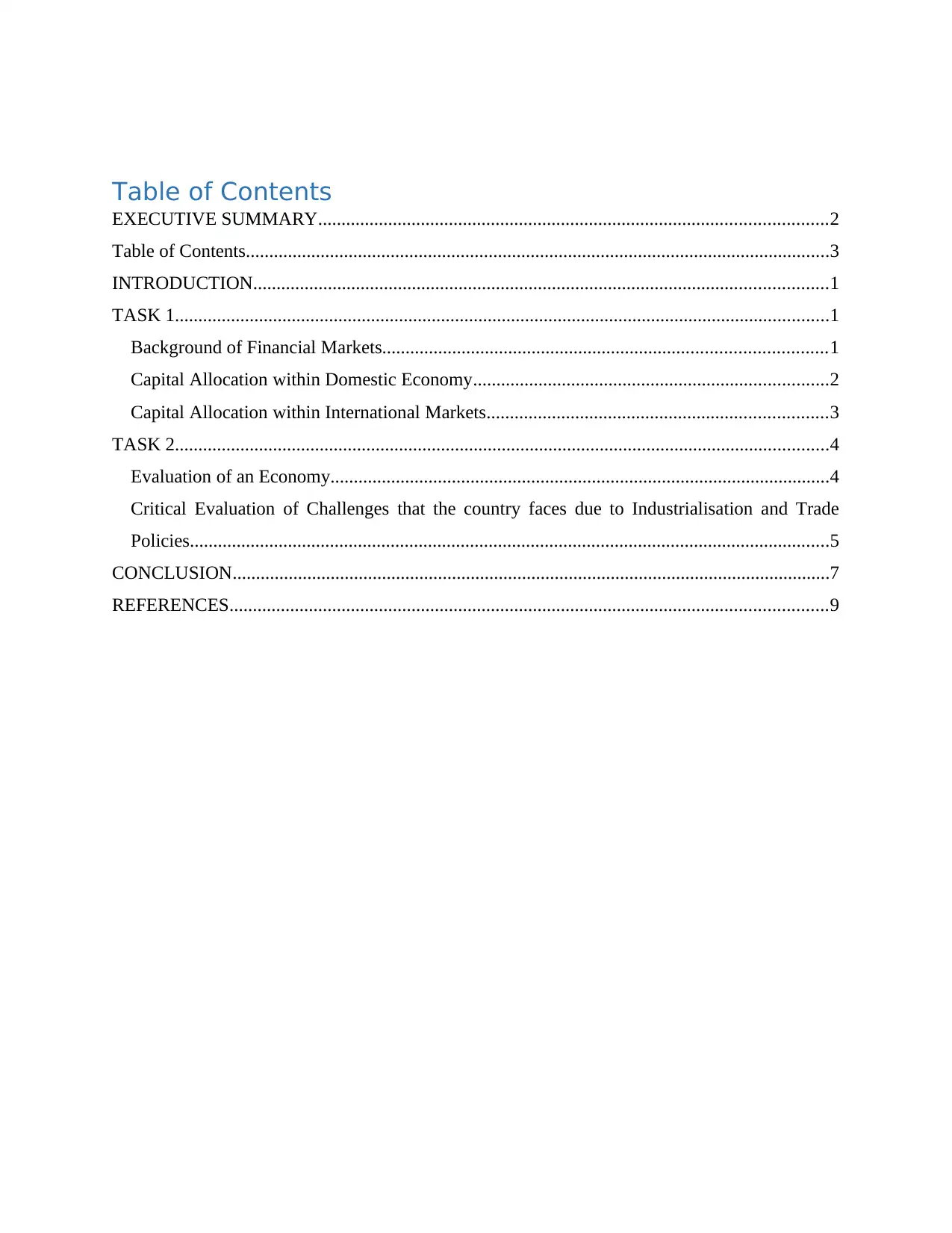
Table of Contents
EXECUTIVE SUMMARY.............................................................................................................2
Table of Contents.............................................................................................................................3
INTRODUCTION...........................................................................................................................1
TASK 1............................................................................................................................................1
Background of Financial Markets...............................................................................................1
Capital Allocation within Domestic Economy............................................................................2
Capital Allocation within International Markets.........................................................................3
TASK 2............................................................................................................................................4
Evaluation of an Economy...........................................................................................................4
Critical Evaluation of Challenges that the country faces due to Industrialisation and Trade
Policies.........................................................................................................................................5
CONCLUSION................................................................................................................................7
REFERENCES................................................................................................................................9
EXECUTIVE SUMMARY.............................................................................................................2
Table of Contents.............................................................................................................................3
INTRODUCTION...........................................................................................................................1
TASK 1............................................................................................................................................1
Background of Financial Markets...............................................................................................1
Capital Allocation within Domestic Economy............................................................................2
Capital Allocation within International Markets.........................................................................3
TASK 2............................................................................................................................................4
Evaluation of an Economy...........................................................................................................4
Critical Evaluation of Challenges that the country faces due to Industrialisation and Trade
Policies.........................................................................................................................................5
CONCLUSION................................................................................................................................7
REFERENCES................................................................................................................................9
⊘ This is a preview!⊘
Do you want full access?
Subscribe today to unlock all pages.

Trusted by 1+ million students worldwide
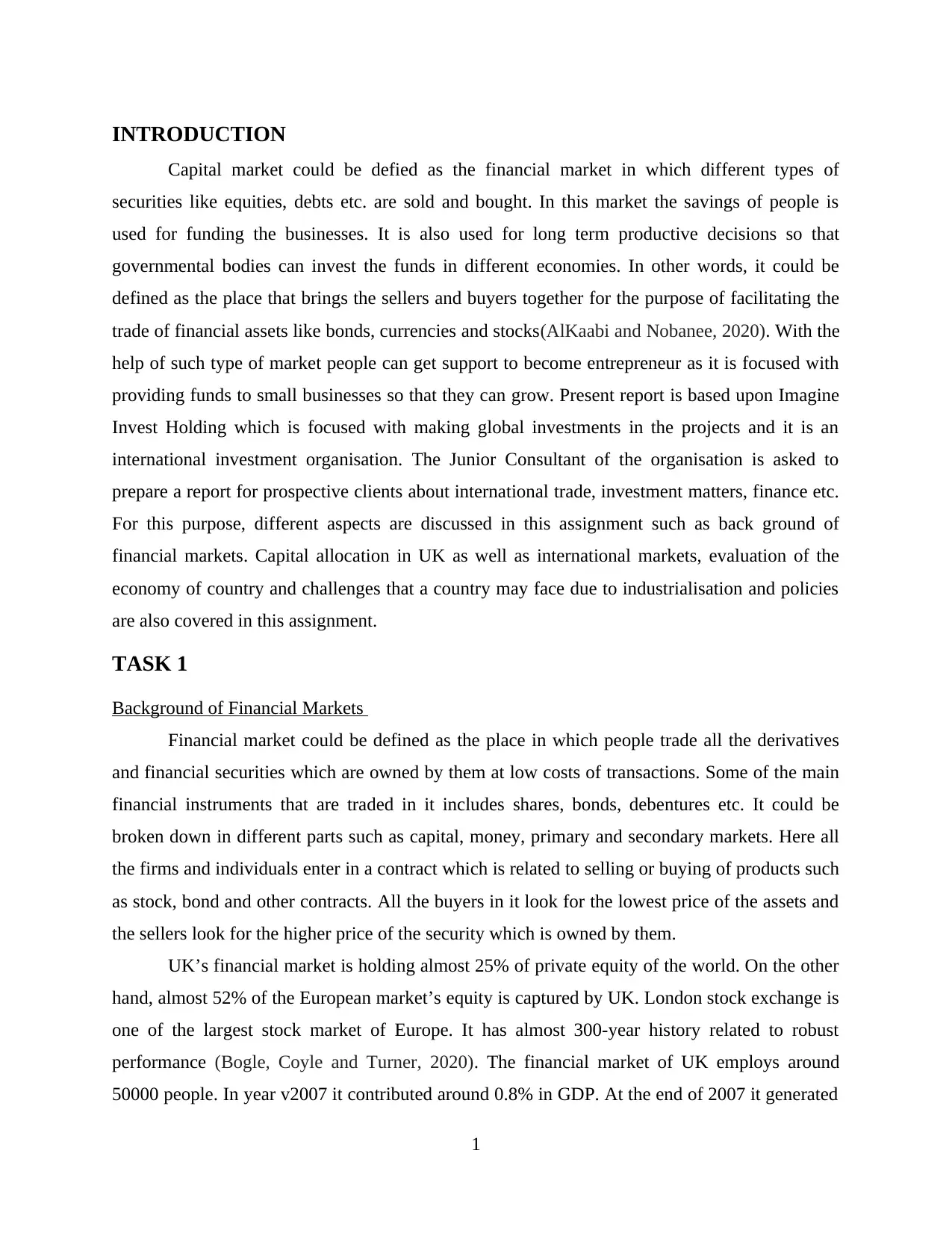
INTRODUCTION
Capital market could be defied as the financial market in which different types of
securities like equities, debts etc. are sold and bought. In this market the savings of people is
used for funding the businesses. It is also used for long term productive decisions so that
governmental bodies can invest the funds in different economies. In other words, it could be
defined as the place that brings the sellers and buyers together for the purpose of facilitating the
trade of financial assets like bonds, currencies and stocks(AlKaabi and Nobanee, 2020). With the
help of such type of market people can get support to become entrepreneur as it is focused with
providing funds to small businesses so that they can grow. Present report is based upon Imagine
Invest Holding which is focused with making global investments in the projects and it is an
international investment organisation. The Junior Consultant of the organisation is asked to
prepare a report for prospective clients about international trade, investment matters, finance etc.
For this purpose, different aspects are discussed in this assignment such as back ground of
financial markets. Capital allocation in UK as well as international markets, evaluation of the
economy of country and challenges that a country may face due to industrialisation and policies
are also covered in this assignment.
TASK 1
Background of Financial Markets
Financial market could be defined as the place in which people trade all the derivatives
and financial securities which are owned by them at low costs of transactions. Some of the main
financial instruments that are traded in it includes shares, bonds, debentures etc. It could be
broken down in different parts such as capital, money, primary and secondary markets. Here all
the firms and individuals enter in a contract which is related to selling or buying of products such
as stock, bond and other contracts. All the buyers in it look for the lowest price of the assets and
the sellers look for the higher price of the security which is owned by them.
UK’s financial market is holding almost 25% of private equity of the world. On the other
hand, almost 52% of the European market’s equity is captured by UK. London stock exchange is
one of the largest stock market of Europe. It has almost 300-year history related to robust
performance (Bogle, Coyle and Turner, 2020). The financial market of UK employs around
50000 people. In year v2007 it contributed around 0.8% in GDP. At the end of 2007 it generated
1
Capital market could be defied as the financial market in which different types of
securities like equities, debts etc. are sold and bought. In this market the savings of people is
used for funding the businesses. It is also used for long term productive decisions so that
governmental bodies can invest the funds in different economies. In other words, it could be
defined as the place that brings the sellers and buyers together for the purpose of facilitating the
trade of financial assets like bonds, currencies and stocks(AlKaabi and Nobanee, 2020). With the
help of such type of market people can get support to become entrepreneur as it is focused with
providing funds to small businesses so that they can grow. Present report is based upon Imagine
Invest Holding which is focused with making global investments in the projects and it is an
international investment organisation. The Junior Consultant of the organisation is asked to
prepare a report for prospective clients about international trade, investment matters, finance etc.
For this purpose, different aspects are discussed in this assignment such as back ground of
financial markets. Capital allocation in UK as well as international markets, evaluation of the
economy of country and challenges that a country may face due to industrialisation and policies
are also covered in this assignment.
TASK 1
Background of Financial Markets
Financial market could be defined as the place in which people trade all the derivatives
and financial securities which are owned by them at low costs of transactions. Some of the main
financial instruments that are traded in it includes shares, bonds, debentures etc. It could be
broken down in different parts such as capital, money, primary and secondary markets. Here all
the firms and individuals enter in a contract which is related to selling or buying of products such
as stock, bond and other contracts. All the buyers in it look for the lowest price of the assets and
the sellers look for the higher price of the security which is owned by them.
UK’s financial market is holding almost 25% of private equity of the world. On the other
hand, almost 52% of the European market’s equity is captured by UK. London stock exchange is
one of the largest stock market of Europe. It has almost 300-year history related to robust
performance (Bogle, Coyle and Turner, 2020). The financial market of UK employs around
50000 people. In year v2007 it contributed around 0.8% in GDP. At the end of 2007 it generated
1
Paraphrase This Document
Need a fresh take? Get an instant paraphrase of this document with our AI Paraphraser
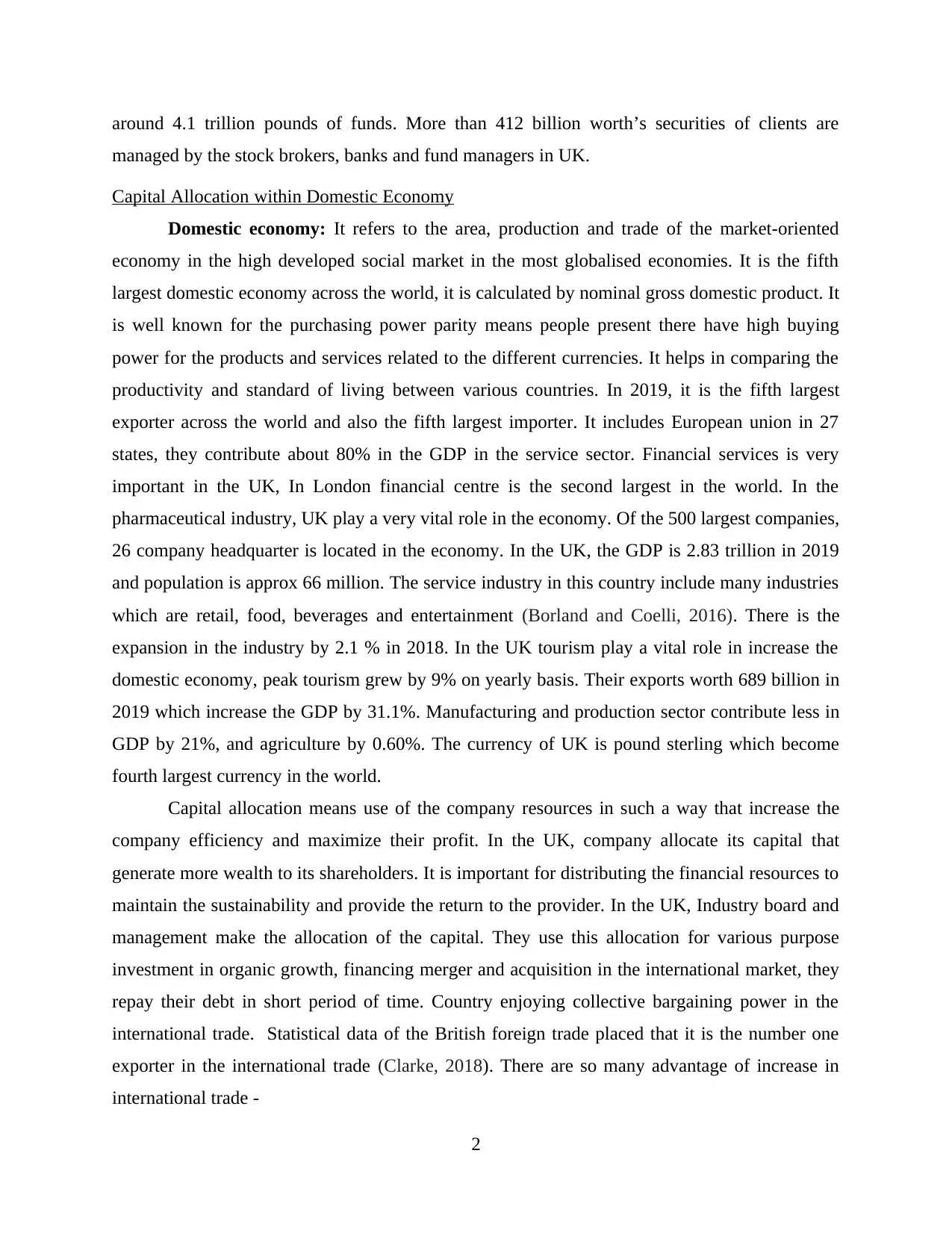
around 4.1 trillion pounds of funds. More than 412 billion worth’s securities of clients are
managed by the stock brokers, banks and fund managers in UK.
Capital Allocation within Domestic Economy
Domestic economy: It refers to the area, production and trade of the market-oriented
economy in the high developed social market in the most globalised economies. It is the fifth
largest domestic economy across the world, it is calculated by nominal gross domestic product. It
is well known for the purchasing power parity means people present there have high buying
power for the products and services related to the different currencies. It helps in comparing the
productivity and standard of living between various countries. In 2019, it is the fifth largest
exporter across the world and also the fifth largest importer. It includes European union in 27
states, they contribute about 80% in the GDP in the service sector. Financial services is very
important in the UK, In London financial centre is the second largest in the world. In the
pharmaceutical industry, UK play a very vital role in the economy. Of the 500 largest companies,
26 company headquarter is located in the economy. In the UK, the GDP is 2.83 trillion in 2019
and population is approx 66 million. The service industry in this country include many industries
which are retail, food, beverages and entertainment (Borland and Coelli, 2016). There is the
expansion in the industry by 2.1 % in 2018. In the UK tourism play a vital role in increase the
domestic economy, peak tourism grew by 9% on yearly basis. Their exports worth 689 billion in
2019 which increase the GDP by 31.1%. Manufacturing and production sector contribute less in
GDP by 21%, and agriculture by 0.60%. The currency of UK is pound sterling which become
fourth largest currency in the world.
Capital allocation means use of the company resources in such a way that increase the
company efficiency and maximize their profit. In the UK, company allocate its capital that
generate more wealth to its shareholders. It is important for distributing the financial resources to
maintain the sustainability and provide the return to the provider. In the UK, Industry board and
management make the allocation of the capital. They use this allocation for various purpose
investment in organic growth, financing merger and acquisition in the international market, they
repay their debt in short period of time. Country enjoying collective bargaining power in the
international trade. Statistical data of the British foreign trade placed that it is the number one
exporter in the international trade (Clarke, 2018). There are so many advantage of increase in
international trade -
2
managed by the stock brokers, banks and fund managers in UK.
Capital Allocation within Domestic Economy
Domestic economy: It refers to the area, production and trade of the market-oriented
economy in the high developed social market in the most globalised economies. It is the fifth
largest domestic economy across the world, it is calculated by nominal gross domestic product. It
is well known for the purchasing power parity means people present there have high buying
power for the products and services related to the different currencies. It helps in comparing the
productivity and standard of living between various countries. In 2019, it is the fifth largest
exporter across the world and also the fifth largest importer. It includes European union in 27
states, they contribute about 80% in the GDP in the service sector. Financial services is very
important in the UK, In London financial centre is the second largest in the world. In the
pharmaceutical industry, UK play a very vital role in the economy. Of the 500 largest companies,
26 company headquarter is located in the economy. In the UK, the GDP is 2.83 trillion in 2019
and population is approx 66 million. The service industry in this country include many industries
which are retail, food, beverages and entertainment (Borland and Coelli, 2016). There is the
expansion in the industry by 2.1 % in 2018. In the UK tourism play a vital role in increase the
domestic economy, peak tourism grew by 9% on yearly basis. Their exports worth 689 billion in
2019 which increase the GDP by 31.1%. Manufacturing and production sector contribute less in
GDP by 21%, and agriculture by 0.60%. The currency of UK is pound sterling which become
fourth largest currency in the world.
Capital allocation means use of the company resources in such a way that increase the
company efficiency and maximize their profit. In the UK, company allocate its capital that
generate more wealth to its shareholders. It is important for distributing the financial resources to
maintain the sustainability and provide the return to the provider. In the UK, Industry board and
management make the allocation of the capital. They use this allocation for various purpose
investment in organic growth, financing merger and acquisition in the international market, they
repay their debt in short period of time. Country enjoying collective bargaining power in the
international trade. Statistical data of the British foreign trade placed that it is the number one
exporter in the international trade (Clarke, 2018). There are so many advantage of increase in
international trade -
2
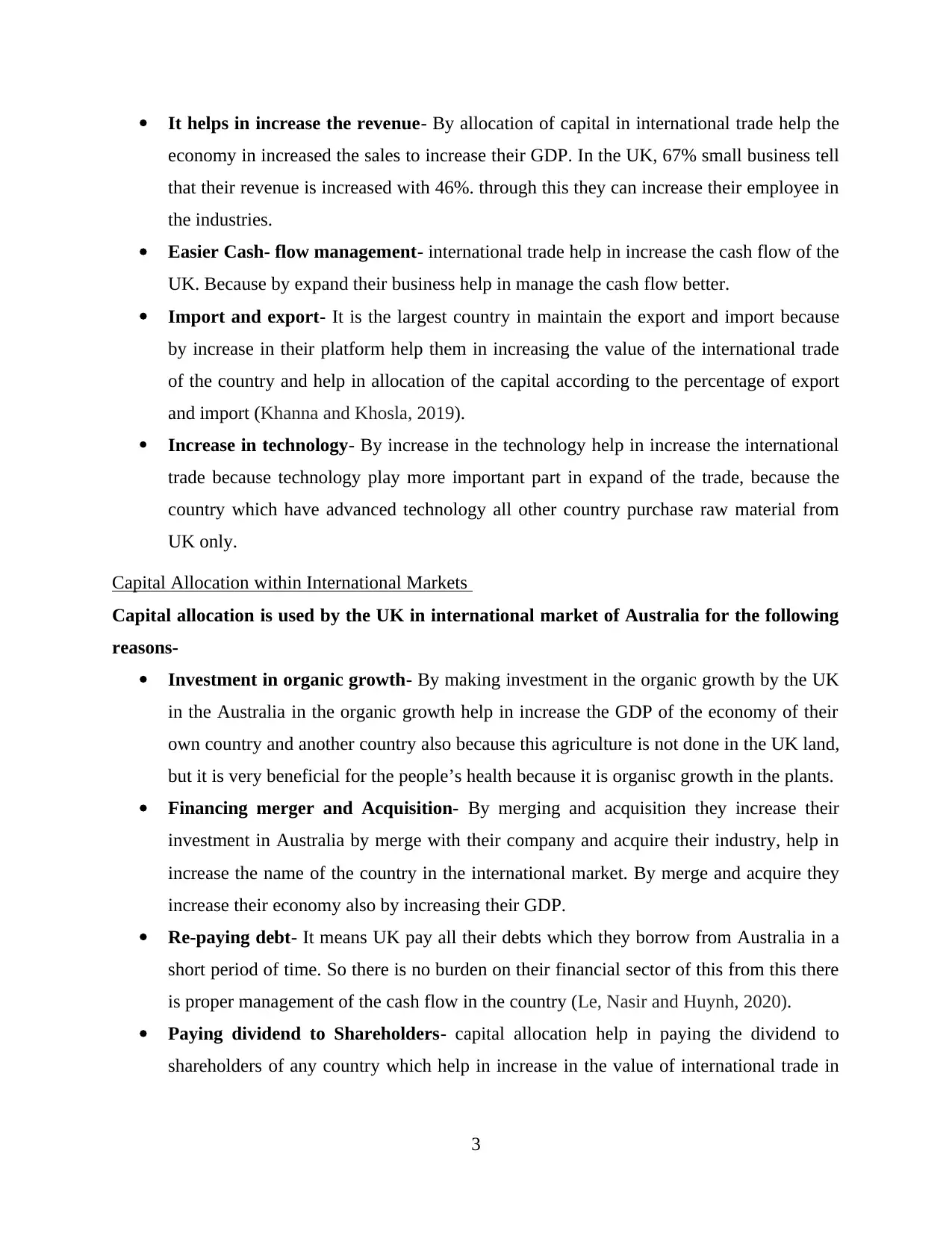
It helps in increase the revenue- By allocation of capital in international trade help the
economy in increased the sales to increase their GDP. In the UK, 67% small business tell
that their revenue is increased with 46%. through this they can increase their employee in
the industries.
Easier Cash- flow management- international trade help in increase the cash flow of the
UK. Because by expand their business help in manage the cash flow better.
Import and export- It is the largest country in maintain the export and import because
by increase in their platform help them in increasing the value of the international trade
of the country and help in allocation of the capital according to the percentage of export
and import (Khanna and Khosla, 2019).
Increase in technology- By increase in the technology help in increase the international
trade because technology play more important part in expand of the trade, because the
country which have advanced technology all other country purchase raw material from
UK only.
Capital Allocation within International Markets
Capital allocation is used by the UK in international market of Australia for the following
reasons-
Investment in organic growth- By making investment in the organic growth by the UK
in the Australia in the organic growth help in increase the GDP of the economy of their
own country and another country also because this agriculture is not done in the UK land,
but it is very beneficial for the people’s health because it is organisc growth in the plants.
Financing merger and Acquisition- By merging and acquisition they increase their
investment in Australia by merge with their company and acquire their industry, help in
increase the name of the country in the international market. By merge and acquire they
increase their economy also by increasing their GDP.
Re-paying debt- It means UK pay all their debts which they borrow from Australia in a
short period of time. So there is no burden on their financial sector of this from this there
is proper management of the cash flow in the country (Le, Nasir and Huynh, 2020).
Paying dividend to Shareholders- capital allocation help in paying the dividend to
shareholders of any country which help in increase in the value of international trade in
3
economy in increased the sales to increase their GDP. In the UK, 67% small business tell
that their revenue is increased with 46%. through this they can increase their employee in
the industries.
Easier Cash- flow management- international trade help in increase the cash flow of the
UK. Because by expand their business help in manage the cash flow better.
Import and export- It is the largest country in maintain the export and import because
by increase in their platform help them in increasing the value of the international trade
of the country and help in allocation of the capital according to the percentage of export
and import (Khanna and Khosla, 2019).
Increase in technology- By increase in the technology help in increase the international
trade because technology play more important part in expand of the trade, because the
country which have advanced technology all other country purchase raw material from
UK only.
Capital Allocation within International Markets
Capital allocation is used by the UK in international market of Australia for the following
reasons-
Investment in organic growth- By making investment in the organic growth by the UK
in the Australia in the organic growth help in increase the GDP of the economy of their
own country and another country also because this agriculture is not done in the UK land,
but it is very beneficial for the people’s health because it is organisc growth in the plants.
Financing merger and Acquisition- By merging and acquisition they increase their
investment in Australia by merge with their company and acquire their industry, help in
increase the name of the country in the international market. By merge and acquire they
increase their economy also by increasing their GDP.
Re-paying debt- It means UK pay all their debts which they borrow from Australia in a
short period of time. So there is no burden on their financial sector of this from this there
is proper management of the cash flow in the country (Le, Nasir and Huynh, 2020).
Paying dividend to Shareholders- capital allocation help in paying the dividend to
shareholders of any country which help in increase in the value of international trade in
3
⊘ This is a preview!⊘
Do you want full access?
Subscribe today to unlock all pages.

Trusted by 1+ million students worldwide
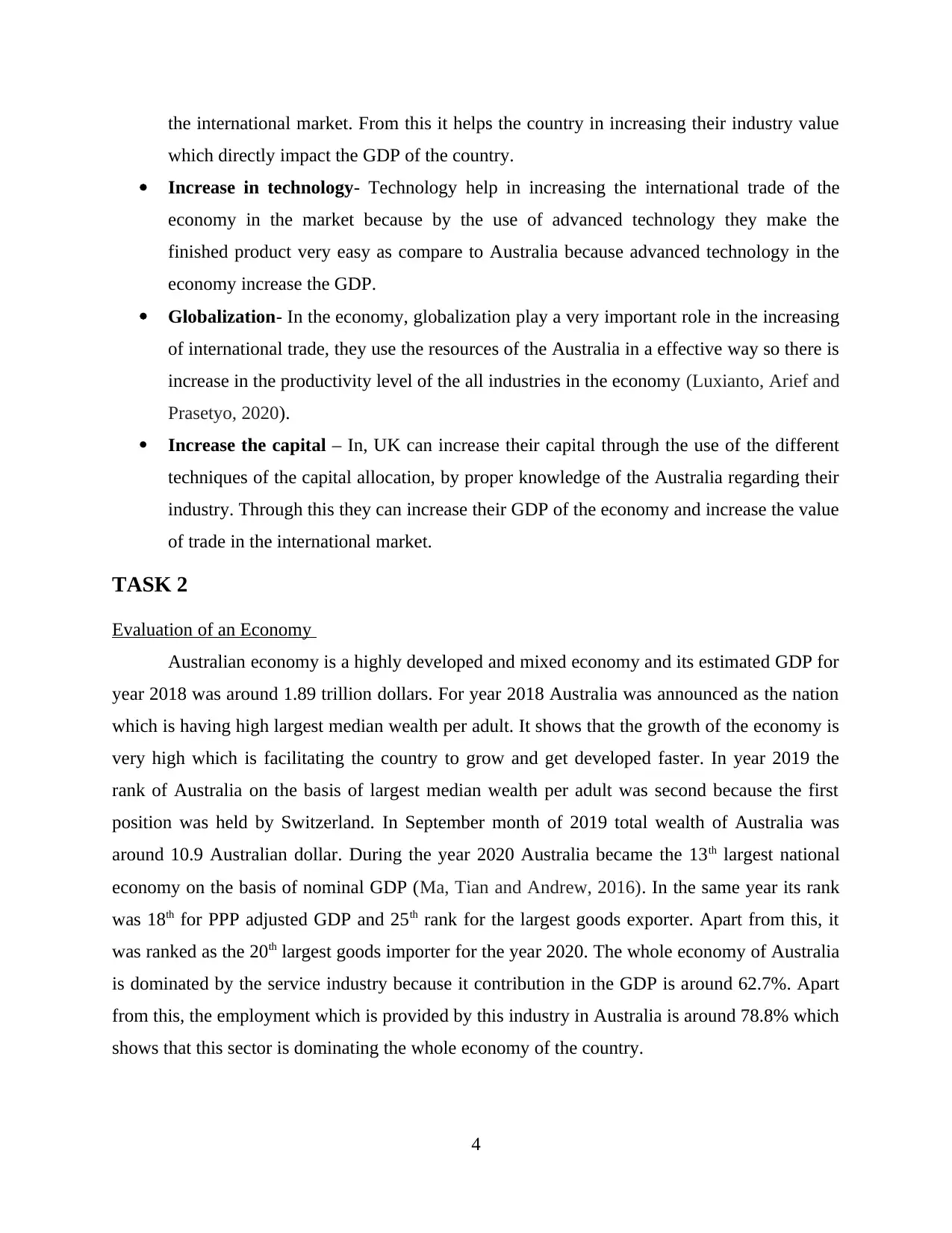
the international market. From this it helps the country in increasing their industry value
which directly impact the GDP of the country.
Increase in technology- Technology help in increasing the international trade of the
economy in the market because by the use of advanced technology they make the
finished product very easy as compare to Australia because advanced technology in the
economy increase the GDP.
Globalization- In the economy, globalization play a very important role in the increasing
of international trade, they use the resources of the Australia in a effective way so there is
increase in the productivity level of the all industries in the economy (Luxianto, Arief and
Prasetyo, 2020).
Increase the capital – In, UK can increase their capital through the use of the different
techniques of the capital allocation, by proper knowledge of the Australia regarding their
industry. Through this they can increase their GDP of the economy and increase the value
of trade in the international market.
TASK 2
Evaluation of an Economy
Australian economy is a highly developed and mixed economy and its estimated GDP for
year 2018 was around 1.89 trillion dollars. For year 2018 Australia was announced as the nation
which is having high largest median wealth per adult. It shows that the growth of the economy is
very high which is facilitating the country to grow and get developed faster. In year 2019 the
rank of Australia on the basis of largest median wealth per adult was second because the first
position was held by Switzerland. In September month of 2019 total wealth of Australia was
around 10.9 Australian dollar. During the year 2020 Australia became the 13th largest national
economy on the basis of nominal GDP (Ma, Tian and Andrew, 2016). In the same year its rank
was 18th for PPP adjusted GDP and 25th rank for the largest goods exporter. Apart from this, it
was ranked as the 20th largest goods importer for the year 2020. The whole economy of Australia
is dominated by the service industry because it contribution in the GDP is around 62.7%. Apart
from this, the employment which is provided by this industry in Australia is around 78.8% which
shows that this sector is dominating the whole economy of the country.
4
which directly impact the GDP of the country.
Increase in technology- Technology help in increasing the international trade of the
economy in the market because by the use of advanced technology they make the
finished product very easy as compare to Australia because advanced technology in the
economy increase the GDP.
Globalization- In the economy, globalization play a very important role in the increasing
of international trade, they use the resources of the Australia in a effective way so there is
increase in the productivity level of the all industries in the economy (Luxianto, Arief and
Prasetyo, 2020).
Increase the capital – In, UK can increase their capital through the use of the different
techniques of the capital allocation, by proper knowledge of the Australia regarding their
industry. Through this they can increase their GDP of the economy and increase the value
of trade in the international market.
TASK 2
Evaluation of an Economy
Australian economy is a highly developed and mixed economy and its estimated GDP for
year 2018 was around 1.89 trillion dollars. For year 2018 Australia was announced as the nation
which is having high largest median wealth per adult. It shows that the growth of the economy is
very high which is facilitating the country to grow and get developed faster. In year 2019 the
rank of Australia on the basis of largest median wealth per adult was second because the first
position was held by Switzerland. In September month of 2019 total wealth of Australia was
around 10.9 Australian dollar. During the year 2020 Australia became the 13th largest national
economy on the basis of nominal GDP (Ma, Tian and Andrew, 2016). In the same year its rank
was 18th for PPP adjusted GDP and 25th rank for the largest goods exporter. Apart from this, it
was ranked as the 20th largest goods importer for the year 2020. The whole economy of Australia
is dominated by the service industry because it contribution in the GDP is around 62.7%. Apart
from this, the employment which is provided by this industry in Australia is around 78.8% which
shows that this sector is dominating the whole economy of the country.
4
Paraphrase This Document
Need a fresh take? Get an instant paraphrase of this document with our AI Paraphraser
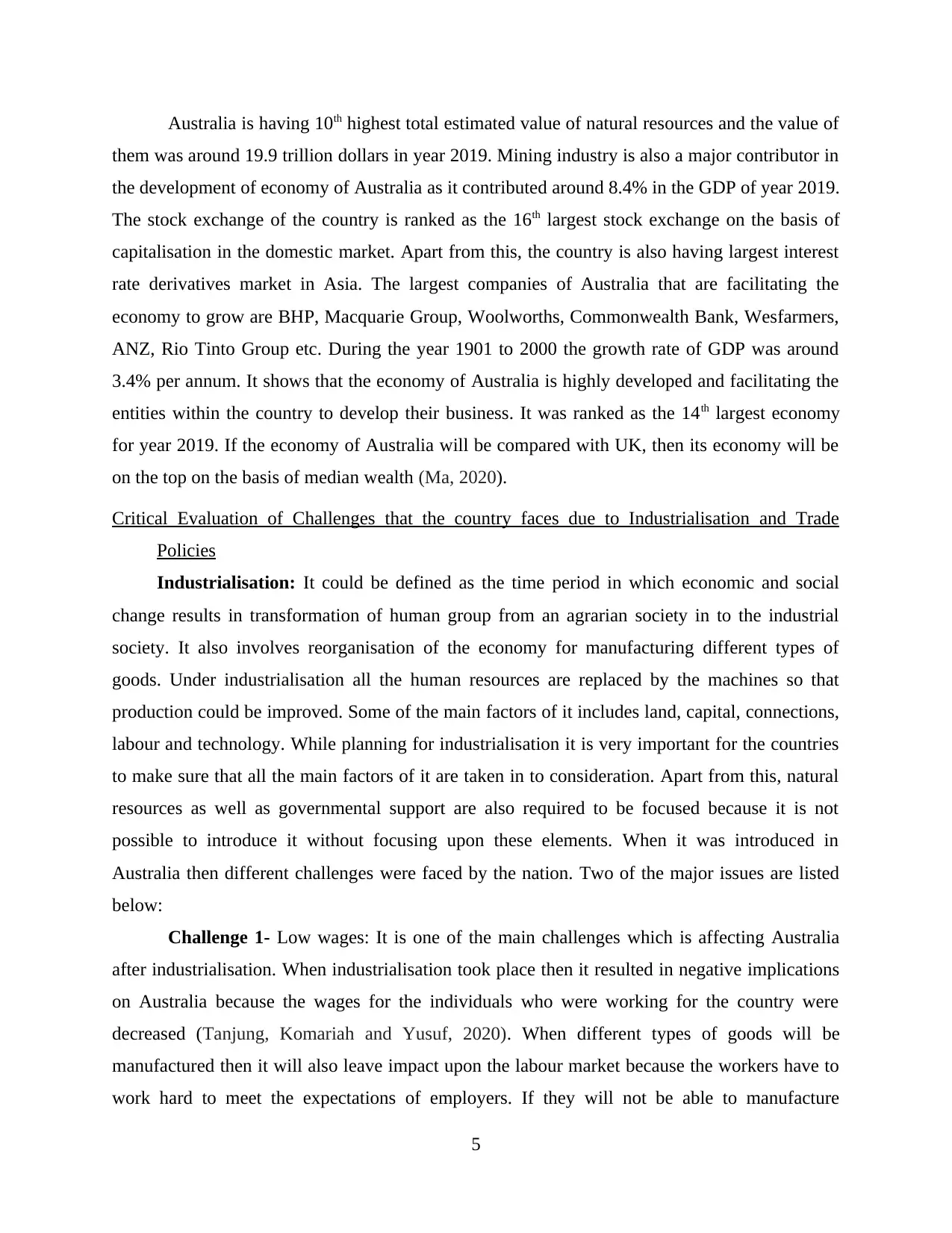
Australia is having 10th highest total estimated value of natural resources and the value of
them was around 19.9 trillion dollars in year 2019. Mining industry is also a major contributor in
the development of economy of Australia as it contributed around 8.4% in the GDP of year 2019.
The stock exchange of the country is ranked as the 16th largest stock exchange on the basis of
capitalisation in the domestic market. Apart from this, the country is also having largest interest
rate derivatives market in Asia. The largest companies of Australia that are facilitating the
economy to grow are BHP, Macquarie Group, Woolworths, Commonwealth Bank, Wesfarmers,
ANZ, Rio Tinto Group etc. During the year 1901 to 2000 the growth rate of GDP was around
3.4% per annum. It shows that the economy of Australia is highly developed and facilitating the
entities within the country to develop their business. It was ranked as the 14th largest economy
for year 2019. If the economy of Australia will be compared with UK, then its economy will be
on the top on the basis of median wealth (Ma, 2020).
Critical Evaluation of Challenges that the country faces due to Industrialisation and Trade
Policies
Industrialisation: It could be defined as the time period in which economic and social
change results in transformation of human group from an agrarian society in to the industrial
society. It also involves reorganisation of the economy for manufacturing different types of
goods. Under industrialisation all the human resources are replaced by the machines so that
production could be improved. Some of the main factors of it includes land, capital, connections,
labour and technology. While planning for industrialisation it is very important for the countries
to make sure that all the main factors of it are taken in to consideration. Apart from this, natural
resources as well as governmental support are also required to be focused because it is not
possible to introduce it without focusing upon these elements. When it was introduced in
Australia then different challenges were faced by the nation. Two of the major issues are listed
below:
Challenge 1- Low wages: It is one of the main challenges which is affecting Australia
after industrialisation. When industrialisation took place then it resulted in negative implications
on Australia because the wages for the individuals who were working for the country were
decreased (Tanjung, Komariah and Yusuf, 2020). When different types of goods will be
manufactured then it will also leave impact upon the labour market because the workers have to
work hard to meet the expectations of employers. If they will not be able to manufacture
5
them was around 19.9 trillion dollars in year 2019. Mining industry is also a major contributor in
the development of economy of Australia as it contributed around 8.4% in the GDP of year 2019.
The stock exchange of the country is ranked as the 16th largest stock exchange on the basis of
capitalisation in the domestic market. Apart from this, the country is also having largest interest
rate derivatives market in Asia. The largest companies of Australia that are facilitating the
economy to grow are BHP, Macquarie Group, Woolworths, Commonwealth Bank, Wesfarmers,
ANZ, Rio Tinto Group etc. During the year 1901 to 2000 the growth rate of GDP was around
3.4% per annum. It shows that the economy of Australia is highly developed and facilitating the
entities within the country to develop their business. It was ranked as the 14th largest economy
for year 2019. If the economy of Australia will be compared with UK, then its economy will be
on the top on the basis of median wealth (Ma, 2020).
Critical Evaluation of Challenges that the country faces due to Industrialisation and Trade
Policies
Industrialisation: It could be defined as the time period in which economic and social
change results in transformation of human group from an agrarian society in to the industrial
society. It also involves reorganisation of the economy for manufacturing different types of
goods. Under industrialisation all the human resources are replaced by the machines so that
production could be improved. Some of the main factors of it includes land, capital, connections,
labour and technology. While planning for industrialisation it is very important for the countries
to make sure that all the main factors of it are taken in to consideration. Apart from this, natural
resources as well as governmental support are also required to be focused because it is not
possible to introduce it without focusing upon these elements. When it was introduced in
Australia then different challenges were faced by the nation. Two of the major issues are listed
below:
Challenge 1- Low wages: It is one of the main challenges which is affecting Australia
after industrialisation. When industrialisation took place then it resulted in negative implications
on Australia because the wages for the individuals who were working for the country were
decreased (Tanjung, Komariah and Yusuf, 2020). When different types of goods will be
manufactured then it will also leave impact upon the labour market because the workers have to
work hard to meet the expectations of employers. If they will not be able to manufacture
5
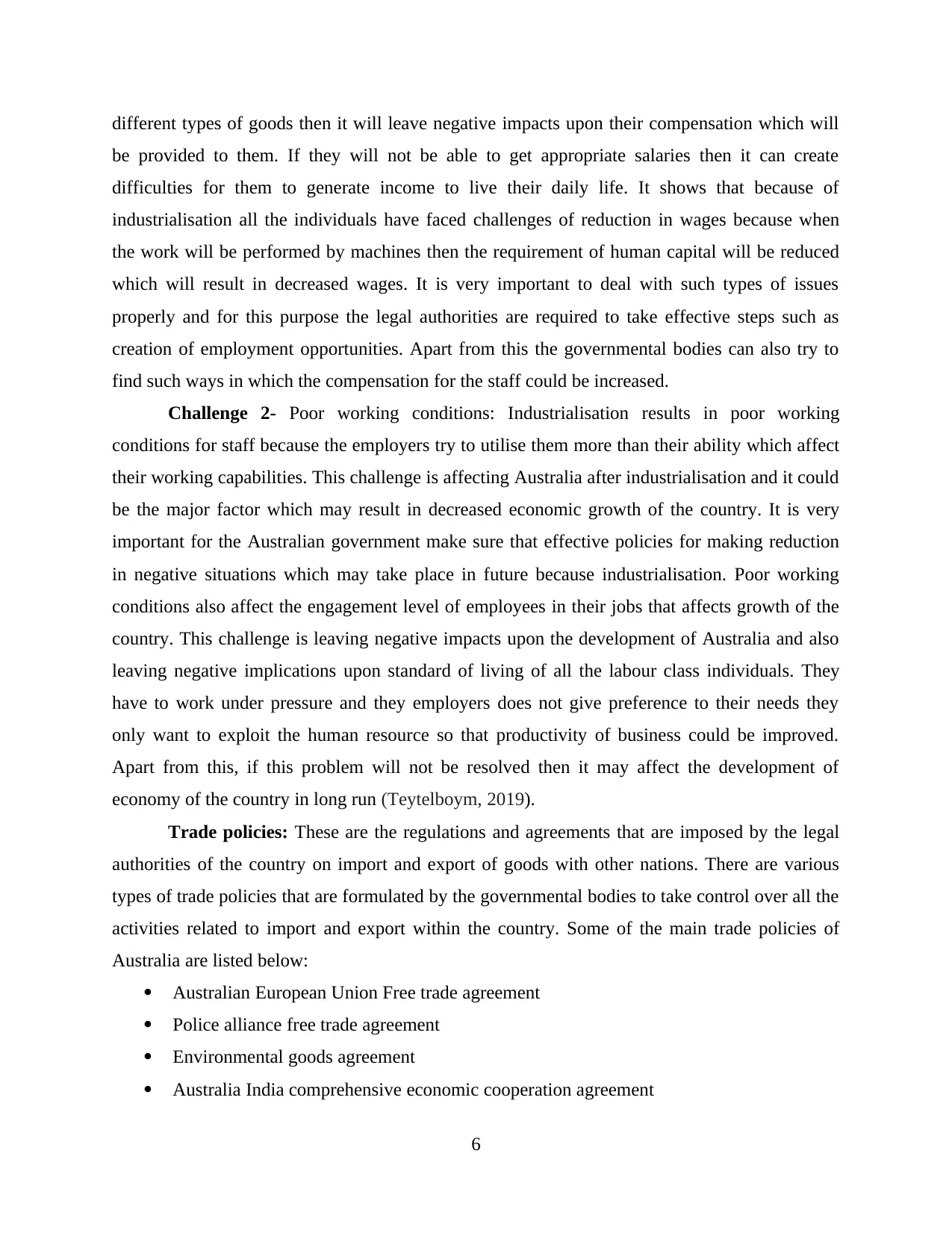
different types of goods then it will leave negative impacts upon their compensation which will
be provided to them. If they will not be able to get appropriate salaries then it can create
difficulties for them to generate income to live their daily life. It shows that because of
industrialisation all the individuals have faced challenges of reduction in wages because when
the work will be performed by machines then the requirement of human capital will be reduced
which will result in decreased wages. It is very important to deal with such types of issues
properly and for this purpose the legal authorities are required to take effective steps such as
creation of employment opportunities. Apart from this the governmental bodies can also try to
find such ways in which the compensation for the staff could be increased.
Challenge 2- Poor working conditions: Industrialisation results in poor working
conditions for staff because the employers try to utilise them more than their ability which affect
their working capabilities. This challenge is affecting Australia after industrialisation and it could
be the major factor which may result in decreased economic growth of the country. It is very
important for the Australian government make sure that effective policies for making reduction
in negative situations which may take place in future because industrialisation. Poor working
conditions also affect the engagement level of employees in their jobs that affects growth of the
country. This challenge is leaving negative impacts upon the development of Australia and also
leaving negative implications upon standard of living of all the labour class individuals. They
have to work under pressure and they employers does not give preference to their needs they
only want to exploit the human resource so that productivity of business could be improved.
Apart from this, if this problem will not be resolved then it may affect the development of
economy of the country in long run (Teytelboym, 2019).
Trade policies: These are the regulations and agreements that are imposed by the legal
authorities of the country on import and export of goods with other nations. There are various
types of trade policies that are formulated by the governmental bodies to take control over all the
activities related to import and export within the country. Some of the main trade policies of
Australia are listed below:
Australian European Union Free trade agreement
Police alliance free trade agreement
Environmental goods agreement
Australia India comprehensive economic cooperation agreement
6
be provided to them. If they will not be able to get appropriate salaries then it can create
difficulties for them to generate income to live their daily life. It shows that because of
industrialisation all the individuals have faced challenges of reduction in wages because when
the work will be performed by machines then the requirement of human capital will be reduced
which will result in decreased wages. It is very important to deal with such types of issues
properly and for this purpose the legal authorities are required to take effective steps such as
creation of employment opportunities. Apart from this the governmental bodies can also try to
find such ways in which the compensation for the staff could be increased.
Challenge 2- Poor working conditions: Industrialisation results in poor working
conditions for staff because the employers try to utilise them more than their ability which affect
their working capabilities. This challenge is affecting Australia after industrialisation and it could
be the major factor which may result in decreased economic growth of the country. It is very
important for the Australian government make sure that effective policies for making reduction
in negative situations which may take place in future because industrialisation. Poor working
conditions also affect the engagement level of employees in their jobs that affects growth of the
country. This challenge is leaving negative impacts upon the development of Australia and also
leaving negative implications upon standard of living of all the labour class individuals. They
have to work under pressure and they employers does not give preference to their needs they
only want to exploit the human resource so that productivity of business could be improved.
Apart from this, if this problem will not be resolved then it may affect the development of
economy of the country in long run (Teytelboym, 2019).
Trade policies: These are the regulations and agreements that are imposed by the legal
authorities of the country on import and export of goods with other nations. There are various
types of trade policies that are formulated by the governmental bodies to take control over all the
activities related to import and export within the country. Some of the main trade policies of
Australia are listed below:
Australian European Union Free trade agreement
Police alliance free trade agreement
Environmental goods agreement
Australia India comprehensive economic cooperation agreement
6
⊘ This is a preview!⊘
Do you want full access?
Subscribe today to unlock all pages.

Trusted by 1+ million students worldwide
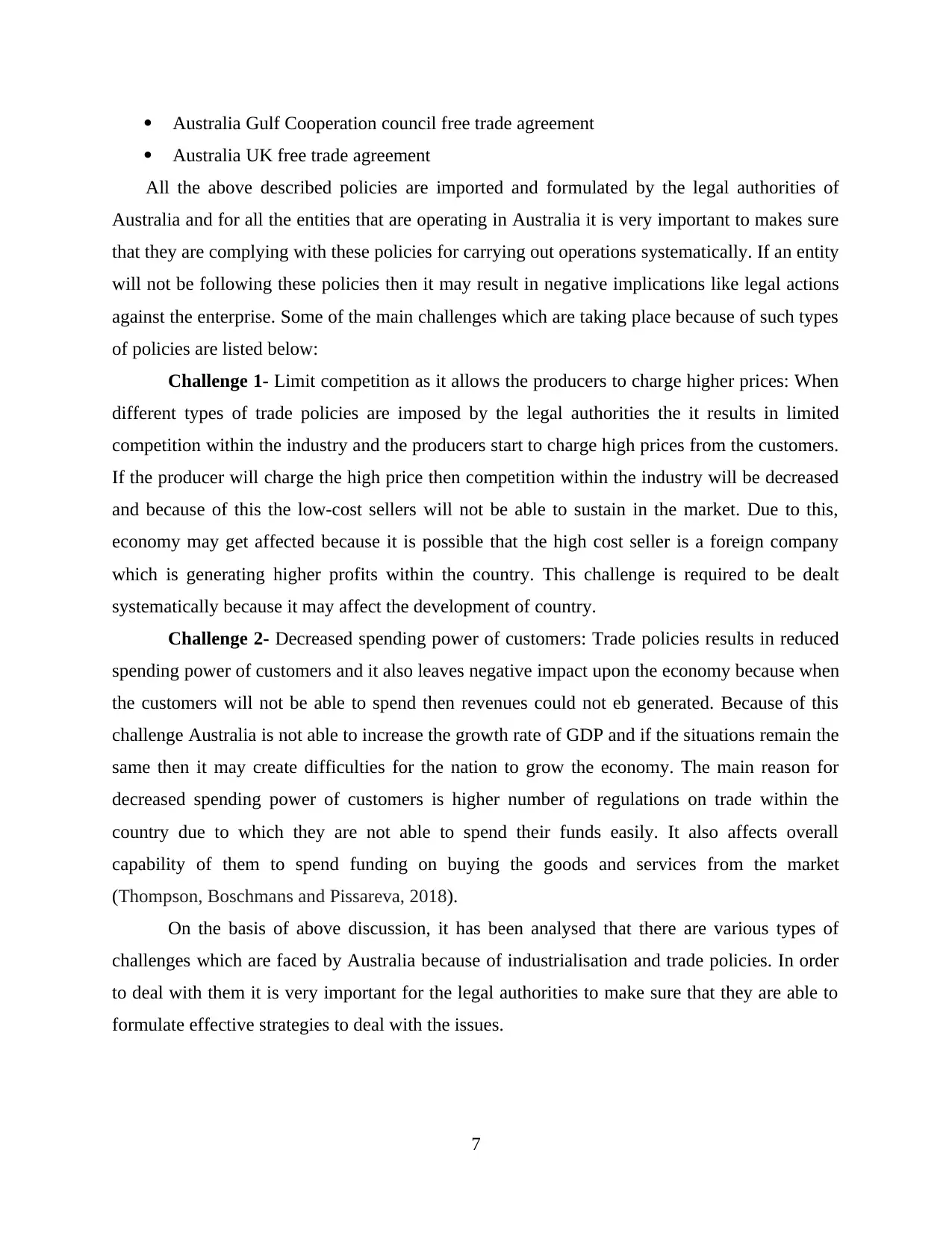
Australia Gulf Cooperation council free trade agreement
Australia UK free trade agreement
All the above described policies are imported and formulated by the legal authorities of
Australia and for all the entities that are operating in Australia it is very important to makes sure
that they are complying with these policies for carrying out operations systematically. If an entity
will not be following these policies then it may result in negative implications like legal actions
against the enterprise. Some of the main challenges which are taking place because of such types
of policies are listed below:
Challenge 1- Limit competition as it allows the producers to charge higher prices: When
different types of trade policies are imposed by the legal authorities the it results in limited
competition within the industry and the producers start to charge high prices from the customers.
If the producer will charge the high price then competition within the industry will be decreased
and because of this the low-cost sellers will not be able to sustain in the market. Due to this,
economy may get affected because it is possible that the high cost seller is a foreign company
which is generating higher profits within the country. This challenge is required to be dealt
systematically because it may affect the development of country.
Challenge 2- Decreased spending power of customers: Trade policies results in reduced
spending power of customers and it also leaves negative impact upon the economy because when
the customers will not be able to spend then revenues could not eb generated. Because of this
challenge Australia is not able to increase the growth rate of GDP and if the situations remain the
same then it may create difficulties for the nation to grow the economy. The main reason for
decreased spending power of customers is higher number of regulations on trade within the
country due to which they are not able to spend their funds easily. It also affects overall
capability of them to spend funding on buying the goods and services from the market
(Thompson, Boschmans and Pissareva, 2018).
On the basis of above discussion, it has been analysed that there are various types of
challenges which are faced by Australia because of industrialisation and trade policies. In order
to deal with them it is very important for the legal authorities to make sure that they are able to
formulate effective strategies to deal with the issues.
7
Australia UK free trade agreement
All the above described policies are imported and formulated by the legal authorities of
Australia and for all the entities that are operating in Australia it is very important to makes sure
that they are complying with these policies for carrying out operations systematically. If an entity
will not be following these policies then it may result in negative implications like legal actions
against the enterprise. Some of the main challenges which are taking place because of such types
of policies are listed below:
Challenge 1- Limit competition as it allows the producers to charge higher prices: When
different types of trade policies are imposed by the legal authorities the it results in limited
competition within the industry and the producers start to charge high prices from the customers.
If the producer will charge the high price then competition within the industry will be decreased
and because of this the low-cost sellers will not be able to sustain in the market. Due to this,
economy may get affected because it is possible that the high cost seller is a foreign company
which is generating higher profits within the country. This challenge is required to be dealt
systematically because it may affect the development of country.
Challenge 2- Decreased spending power of customers: Trade policies results in reduced
spending power of customers and it also leaves negative impact upon the economy because when
the customers will not be able to spend then revenues could not eb generated. Because of this
challenge Australia is not able to increase the growth rate of GDP and if the situations remain the
same then it may create difficulties for the nation to grow the economy. The main reason for
decreased spending power of customers is higher number of regulations on trade within the
country due to which they are not able to spend their funds easily. It also affects overall
capability of them to spend funding on buying the goods and services from the market
(Thompson, Boschmans and Pissareva, 2018).
On the basis of above discussion, it has been analysed that there are various types of
challenges which are faced by Australia because of industrialisation and trade policies. In order
to deal with them it is very important for the legal authorities to make sure that they are able to
formulate effective strategies to deal with the issues.
7
Paraphrase This Document
Need a fresh take? Get an instant paraphrase of this document with our AI Paraphraser
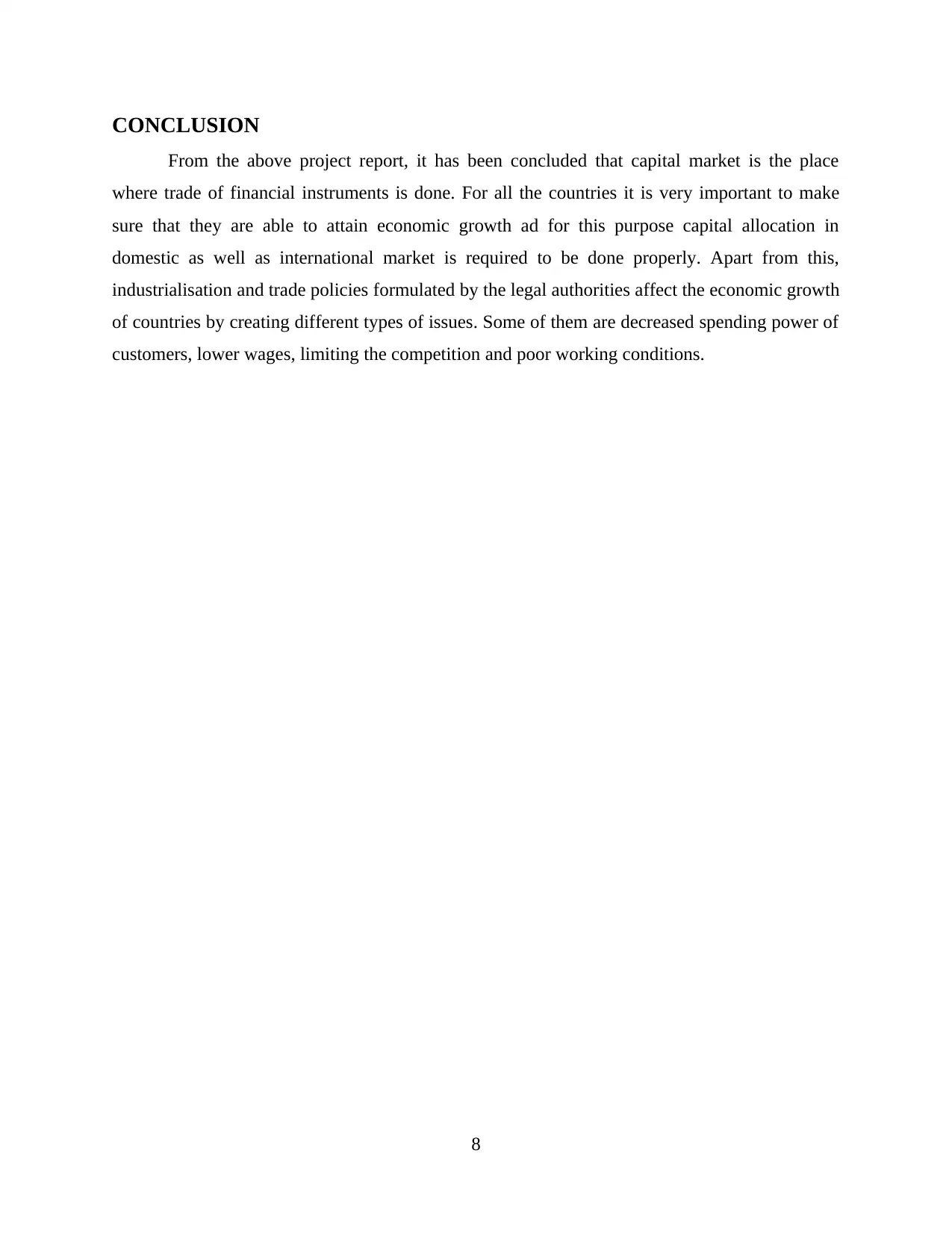
CONCLUSION
From the above project report, it has been concluded that capital market is the place
where trade of financial instruments is done. For all the countries it is very important to make
sure that they are able to attain economic growth ad for this purpose capital allocation in
domestic as well as international market is required to be done properly. Apart from this,
industrialisation and trade policies formulated by the legal authorities affect the economic growth
of countries by creating different types of issues. Some of them are decreased spending power of
customers, lower wages, limiting the competition and poor working conditions.
8
From the above project report, it has been concluded that capital market is the place
where trade of financial instruments is done. For all the countries it is very important to make
sure that they are able to attain economic growth ad for this purpose capital allocation in
domestic as well as international market is required to be done properly. Apart from this,
industrialisation and trade policies formulated by the legal authorities affect the economic growth
of countries by creating different types of issues. Some of them are decreased spending power of
customers, lower wages, limiting the competition and poor working conditions.
8
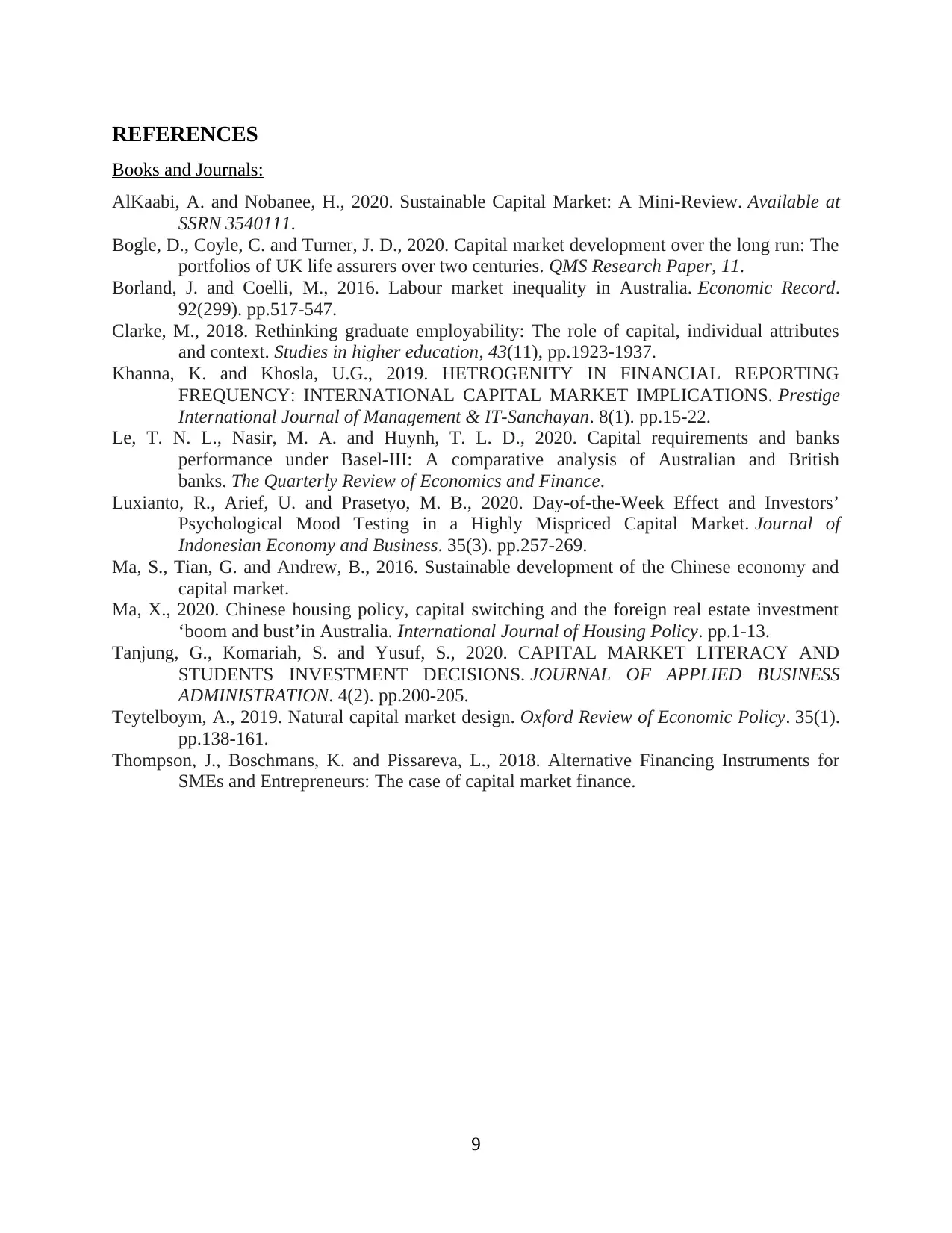
REFERENCES
Books and Journals:
AlKaabi, A. and Nobanee, H., 2020. Sustainable Capital Market: A Mini-Review. Available at
SSRN 3540111.
Bogle, D., Coyle, C. and Turner, J. D., 2020. Capital market development over the long run: The
portfolios of UK life assurers over two centuries. QMS Research Paper, 11.
Borland, J. and Coelli, M., 2016. Labour market inequality in Australia. Economic Record.
92(299). pp.517-547.
Clarke, M., 2018. Rethinking graduate employability: The role of capital, individual attributes
and context. Studies in higher education, 43(11), pp.1923-1937.
Khanna, K. and Khosla, U.G., 2019. HETROGENITY IN FINANCIAL REPORTING
FREQUENCY: INTERNATIONAL CAPITAL MARKET IMPLICATIONS. Prestige
International Journal of Management & IT-Sanchayan. 8(1). pp.15-22.
Le, T. N. L., Nasir, M. A. and Huynh, T. L. D., 2020. Capital requirements and banks
performance under Basel-III: A comparative analysis of Australian and British
banks. The Quarterly Review of Economics and Finance.
Luxianto, R., Arief, U. and Prasetyo, M. B., 2020. Day-of-the-Week Effect and Investors’
Psychological Mood Testing in a Highly Mispriced Capital Market. Journal of
Indonesian Economy and Business. 35(3). pp.257-269.
Ma, S., Tian, G. and Andrew, B., 2016. Sustainable development of the Chinese economy and
capital market.
Ma, X., 2020. Chinese housing policy, capital switching and the foreign real estate investment
‘boom and bust’in Australia. International Journal of Housing Policy. pp.1-13.
Tanjung, G., Komariah, S. and Yusuf, S., 2020. CAPITAL MARKET LITERACY AND
STUDENTS INVESTMENT DECISIONS. JOURNAL OF APPLIED BUSINESS
ADMINISTRATION. 4(2). pp.200-205.
Teytelboym, A., 2019. Natural capital market design. Oxford Review of Economic Policy. 35(1).
pp.138-161.
Thompson, J., Boschmans, K. and Pissareva, L., 2018. Alternative Financing Instruments for
SMEs and Entrepreneurs: The case of capital market finance.
9
Books and Journals:
AlKaabi, A. and Nobanee, H., 2020. Sustainable Capital Market: A Mini-Review. Available at
SSRN 3540111.
Bogle, D., Coyle, C. and Turner, J. D., 2020. Capital market development over the long run: The
portfolios of UK life assurers over two centuries. QMS Research Paper, 11.
Borland, J. and Coelli, M., 2016. Labour market inequality in Australia. Economic Record.
92(299). pp.517-547.
Clarke, M., 2018. Rethinking graduate employability: The role of capital, individual attributes
and context. Studies in higher education, 43(11), pp.1923-1937.
Khanna, K. and Khosla, U.G., 2019. HETROGENITY IN FINANCIAL REPORTING
FREQUENCY: INTERNATIONAL CAPITAL MARKET IMPLICATIONS. Prestige
International Journal of Management & IT-Sanchayan. 8(1). pp.15-22.
Le, T. N. L., Nasir, M. A. and Huynh, T. L. D., 2020. Capital requirements and banks
performance under Basel-III: A comparative analysis of Australian and British
banks. The Quarterly Review of Economics and Finance.
Luxianto, R., Arief, U. and Prasetyo, M. B., 2020. Day-of-the-Week Effect and Investors’
Psychological Mood Testing in a Highly Mispriced Capital Market. Journal of
Indonesian Economy and Business. 35(3). pp.257-269.
Ma, S., Tian, G. and Andrew, B., 2016. Sustainable development of the Chinese economy and
capital market.
Ma, X., 2020. Chinese housing policy, capital switching and the foreign real estate investment
‘boom and bust’in Australia. International Journal of Housing Policy. pp.1-13.
Tanjung, G., Komariah, S. and Yusuf, S., 2020. CAPITAL MARKET LITERACY AND
STUDENTS INVESTMENT DECISIONS. JOURNAL OF APPLIED BUSINESS
ADMINISTRATION. 4(2). pp.200-205.
Teytelboym, A., 2019. Natural capital market design. Oxford Review of Economic Policy. 35(1).
pp.138-161.
Thompson, J., Boschmans, K. and Pissareva, L., 2018. Alternative Financing Instruments for
SMEs and Entrepreneurs: The case of capital market finance.
9
⊘ This is a preview!⊘
Do you want full access?
Subscribe today to unlock all pages.

Trusted by 1+ million students worldwide
1 out of 12
Related Documents
Your All-in-One AI-Powered Toolkit for Academic Success.
+13062052269
info@desklib.com
Available 24*7 on WhatsApp / Email
![[object Object]](/_next/static/media/star-bottom.7253800d.svg)
Unlock your academic potential
Copyright © 2020–2026 A2Z Services. All Rights Reserved. Developed and managed by ZUCOL.





